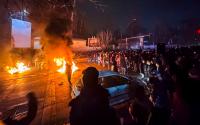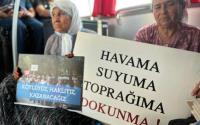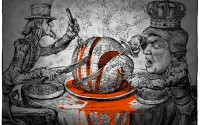29 February 2008Alternet
On a cold January morning in 1933, Adolf Hitler was sworn in as chancellor of one of the world's great democracies. While the world has duly noted its 75th anniversary last month, it is not the cold January morning but a hot February night that should command our greatest attention. It was 75 years ago this week that the parliament building, the Reichstag, was set ablaze. As the Reichstag burned, Hitler was busy converting the chancellorship into a dictatorship.
As we engage in the democratic process of picking a new president, a look back at Hitler's dizzying rise is an instructive reminder of the fragility of democracy, then and now.
During the period of long simmering fears over an amorphous international threat -- communism -- German opposition forces were willing to give Hitler the chancellorship despite his capturing only a minority of votes during the recent election. But it was the Feb. 27 Reichstag fire, a fire that the Nazis accused a Dutch Communist of setting, that sent the country on a quick road to fascism. Within 60 days, Hitler had begun the process of arbitrary arrests, warrantless surveillance and searches, incarceration without charges, suspension of habeas corpus, the implementation of torture, the mustering of a private army, and was pushing through the passage of the "Enabling Act," which gave Hitler and his henchmen the power to ignore the legislative branch and write laws themselves.
We are not a fascist country. Nobody is contemplating the mass arrest or elimination of Communists, Jews, or any other groups. To compare our secret prisons, our warrantless spying, our suspensions of habeas corpus, our torture, our mercenaries, and our "signing statements" that flout legislative laws to theirs is a dangerous oversimplification. To compare Bush to Hitler -- Hugo Chavez-like -- insults the memory of Hitler's victims.
And yet, the parallels are worth noting. As the fire raged in the Reichstag, and Hitler was fanning the flames of fear, Germans made a decision that can be summed up by words from Benjamin Franklin's 18th century aphorism: they chose to "give up Essential Liberty to purchase a little Temporary Safety" and they received neither. What the Reichstag fire reminds us is how tenuous democracy can be. Today, we still live in a democracy, and we still live freely, as the Germans did before the Reichstag fire. But what will America look like after -- God forbid -- another 9/11 or the equivalent of the Reichstag fire?
Sandra Day O'Connor once said, "It takes a lot of degeneration before a country falls into dictatorship. But we should avoid these ends by avoiding these beginnings." Marc vander Heyden, the former president of my college, a man whose Belgian family hid another family from the Nazis, used to warn students and faculty that "we are always one generation away from barbarism." In Germany, it took less than a generation; it took a maniac, a fire, and terrified country to tip a democracy into dictatorship.
Two recent books seek to explore the fragile state of our democracy and they both argue that our essential liberties have started to erode. In her careful book, The End of America, Naomi Wolf looks at ten steps taken by all countries that abandon democracy for fascism. They all "invoke an external and internal threat, establish secret prisons, develop a paramilitary force, surveil ordinary citizens, infiltrate citizens' groups, arbitrarily detain and release citizens, target key individuals, restrict the press, cast criticism as 'espionage' and dissent as 'treason,' [and] subvert the rule of law."
Wolf shows how the Nazis were clearly making this shift in a small window of time 75 years ago. She also argues, methodically, that we, too, are seeing activity in each of the ten areas. Wolf is careful not to call us a fascist country. But, she says, we may be on the verge of a "fascist shift" that involves larding the executive branch with unprecedented and dangerous power.
Charlie Savage, a Boston Globe reporter who won the Pulitzer Prize for his reports on George Bush's "signing statements," wrote a book whose title explains its thesis: Takeover: The Return of the Imperial Presidency and the Subversion of American Democracy. The Bush administration's actions, when taken together, add up to a massive attempt to expand the power of the executive branch at the expense of everything else, he writes.
Given the high stakes -- a potential shift away from the democracy we cherish -- what are the questions we should be asking about our presidential candidates? Jay Rosen, a media critic and blogger, argues that one of the failures of American journalism is its embrace of the horserace model of reporting, at the exclusion of everything else. Rosen proposes a different focus, one that will ask: "Does your candidate support ... unbuilding the Bush Presidency?"
Here's the good news: After the withdrawal of Mitt Romney, who infamously said he'd "double Guantanamo," all of the remaining frontrunners would bring us back from the precipice. Responding to questions by Savage, Hillary Clinton, Barack Obama, and John McCain said that they would eliminate signing statements or use them sparingly. Although McCain's recent vote to allow waterboarding is a puzzling exception, all three have spoken out against torture.
Here's the bad news: As Savage points out in his book, even if the next president overturns the executive branch's newly assumed powers, the precedent remains. Savage quotes Bruce Fein, a deputy attorney general in the Reagan administration: "The theory used by the administration," Fein said, "could equally justify mail openings, burglary, torture, or internment camps, all in the name of gathering foreign intelligence. Unless rebuked, it will lie around like a loaded weapon ready to be used by any incumbent who claims an urgent need." When Franklin Roosevelt enacted military tribunals in the Second World War, he used Lincoln's actions as a justification. When Bush did so, he cited Lincoln and Roosevelt.
Since 9/11, we've asked our politicians to tell us how they will protect us. We should also ask them to provide detailed plans about how they will protect our democracy and our civil rights.
In the next two months, as we exercise and celebrate our rights in a democratic society, we would be wise to remember the two months, 75 years ago, when a fire helped to turn a democracy into a dictatorship. The clouds of the Reichstag fire cast a shadow of darkness over Germany, a shadow that can still chill us, and instruct us, today.
See more stories tagged with: bush, rights, democracy, dictatorship, clintin, obama, mccain
David T. Z. Mindich is a professor of journalism and mass communication at Saint Michael's College. Mindich is the author, most recently, of Tuned Out: Why Americans Under 40 Don't Follow the News (Oxford University Press, 2005). His articles have appeared in the Wall Street Journal, New York Magazine, the Chronicle of Higher Education, the Wilson Quarterly, and other publications.






